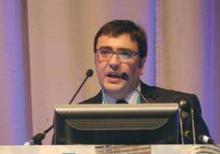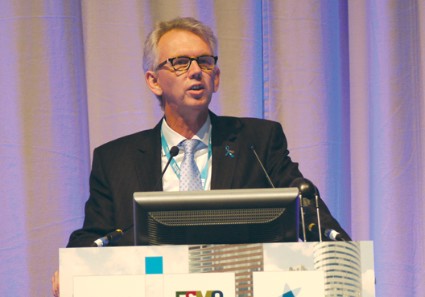User login
AMSTERDAM – Ipilimumab may be effective in castration-resistant prostate cancer if patients have a low burden of disease, based on phase III trial results reported at the multidisciplinary European cancer congresses.
In patients whose disease progressed within 6 months of docetaxel therapy, the primary endpoint of overall survival just missed reaching statistical significance in the CA184-043 trial at a median of 11.2 months in patients treated with ipilimumab (Yervoy) and of 10 months for those given placebo (hazard ratio [HR] = 0.85, P = .0053).
Overall survival at 1 year was 47% and 40% in each group, respectively, and 26% and 15% at 2 years.
Patients without visceral metastases were more likely to benefit than were those with visceral metastases, reported Dr. Winald Gerritsen of Radboud University Medical Center in Nijmegen, the Netherlands. The HR for overall survival according to the absence or presence of visceral metastases was 0.73.
Overall survival was better with ipilimumab in patients with an ECOG performance status of 0 rather than 1 (HR = 0.72), alkaline phosphatase levels less than 1.5 times the upper limit of normal rather than higher (HR = 0.78), hemoglobin levels of 11 g/dL rather than lower values (0.79), and normal rather than elevated lactate dehydrogenase levels (HR = 0.82).
Furthermore, an exploratory subgroup analysis showed a greater overall survival benefit for immunotherapy in patients with a better prognostic profile, based on alkaline phosphatase level, hemoglobin level, and the absence of visceral metastases. Overall survival was 22.7 months in these patients and 15.8 months for patients in the placebo group (HR = 0.62).
Progression-free survival was also significantly improved at 4 months for ipilimumab therapy and 3 months for placebo (HR = 0.70; P less than .0001). Further, a higher percentage of patients had a prostate-specific antigen response if they were given the immunotherapy (13.1% vs. 5.3%).
The CA184-043 study comprised 799 men with castration-resistant prostate cancer (CRPC) who had received prior chemotherapy with docetaxel but had signs of progression within 6 months of treatment. Subjects had to have one or more symptomatic bone metastases that could be irradiated with a single dose of radiotherapy (8 Gy). After irradiation, 399 men were randomized to receive ipilimumab at an intravenously infused dose of 10 mg/kg on weeks 1, 4, 7 and 10, and then every 12 weeks until progression or intolerable toxicity, and 400 men were randomized to receive a matching placebo.
Treatment-related adverse events occurred in 75% of those randomized to ipilimumab; 36% of the adverse events were grade 3 or higher. The corresponding percentages for those in the placebo arm were 45.5% and 10%. Grade 3 adverse events in the ipilimumab and placebo arms included gastrointestinal (18% vs. 0.8%), liver-related (4.6% vs. 1.3%), endocrine (2% vs. 0.5%), dermatologic (1% vs. 0%), and neurologic (0.3% vs. 0%).
There were 266 deaths in the active treatment arm and 304 in the placebo arm. Disease progression was the cause of death in 51.9% given active treatment and 61.4% given placebo. Toxicity due to ipilimumab was identified as a cause of death in 1% of patients.
The safety profile of ipilimumab in this study was consistent with that in previously defined adverse event profiles, Dr. Gerritsen maintained, and adverse events could usually be managed with standard management algorithms.
Discussant David Olmos of the Spanish National Cancer Research Centre in Madrid said that 19.8% in the treatment arm and 1.5% in the placebo arm discontinued treatment due to adverse events; 51% actually received four or more doses of the immunotherapy.
The postdocetaxel setting may not be the right one for testing the immunotherapy, he said. Tumor burden is related to the chances a vaccine treatment might work.
"Future trials should consider exploring the activity of a T-cell modulating agent in early settings of castration-resistant prostate cancer," Dr. Olmos proposed.
Ipilimumab 3 mg/kg monotherapy is currently licensed for the treatment of unresectable or metastatic melanoma in more than 40 countries. There are ongoing studies looking at its utility as an adjuvant treatment for melanoma and non–small-cell lung cancer, as well as an ongoing phase III trial in chemotherapy-naive CRPC.
The CA184-043 study was funded by Bristol-Myers Squibb. Dr. Gerritsen has participated in advisory boards for BMS, as well as other pharmaceutical companies, and received speaker’s fees from BMS, Astellas, and Jansen. Dr. Olmos has received speaker fees from Janssen-Cilag and Novartis, and consultant fees for advisory board participation from Janssen Diagnostic.
AMSTERDAM – Ipilimumab may be effective in castration-resistant prostate cancer if patients have a low burden of disease, based on phase III trial results reported at the multidisciplinary European cancer congresses.
In patients whose disease progressed within 6 months of docetaxel therapy, the primary endpoint of overall survival just missed reaching statistical significance in the CA184-043 trial at a median of 11.2 months in patients treated with ipilimumab (Yervoy) and of 10 months for those given placebo (hazard ratio [HR] = 0.85, P = .0053).
Overall survival at 1 year was 47% and 40% in each group, respectively, and 26% and 15% at 2 years.
Patients without visceral metastases were more likely to benefit than were those with visceral metastases, reported Dr. Winald Gerritsen of Radboud University Medical Center in Nijmegen, the Netherlands. The HR for overall survival according to the absence or presence of visceral metastases was 0.73.
Overall survival was better with ipilimumab in patients with an ECOG performance status of 0 rather than 1 (HR = 0.72), alkaline phosphatase levels less than 1.5 times the upper limit of normal rather than higher (HR = 0.78), hemoglobin levels of 11 g/dL rather than lower values (0.79), and normal rather than elevated lactate dehydrogenase levels (HR = 0.82).
Furthermore, an exploratory subgroup analysis showed a greater overall survival benefit for immunotherapy in patients with a better prognostic profile, based on alkaline phosphatase level, hemoglobin level, and the absence of visceral metastases. Overall survival was 22.7 months in these patients and 15.8 months for patients in the placebo group (HR = 0.62).
Progression-free survival was also significantly improved at 4 months for ipilimumab therapy and 3 months for placebo (HR = 0.70; P less than .0001). Further, a higher percentage of patients had a prostate-specific antigen response if they were given the immunotherapy (13.1% vs. 5.3%).
The CA184-043 study comprised 799 men with castration-resistant prostate cancer (CRPC) who had received prior chemotherapy with docetaxel but had signs of progression within 6 months of treatment. Subjects had to have one or more symptomatic bone metastases that could be irradiated with a single dose of radiotherapy (8 Gy). After irradiation, 399 men were randomized to receive ipilimumab at an intravenously infused dose of 10 mg/kg on weeks 1, 4, 7 and 10, and then every 12 weeks until progression or intolerable toxicity, and 400 men were randomized to receive a matching placebo.
Treatment-related adverse events occurred in 75% of those randomized to ipilimumab; 36% of the adverse events were grade 3 or higher. The corresponding percentages for those in the placebo arm were 45.5% and 10%. Grade 3 adverse events in the ipilimumab and placebo arms included gastrointestinal (18% vs. 0.8%), liver-related (4.6% vs. 1.3%), endocrine (2% vs. 0.5%), dermatologic (1% vs. 0%), and neurologic (0.3% vs. 0%).
There were 266 deaths in the active treatment arm and 304 in the placebo arm. Disease progression was the cause of death in 51.9% given active treatment and 61.4% given placebo. Toxicity due to ipilimumab was identified as a cause of death in 1% of patients.
The safety profile of ipilimumab in this study was consistent with that in previously defined adverse event profiles, Dr. Gerritsen maintained, and adverse events could usually be managed with standard management algorithms.
Discussant David Olmos of the Spanish National Cancer Research Centre in Madrid said that 19.8% in the treatment arm and 1.5% in the placebo arm discontinued treatment due to adverse events; 51% actually received four or more doses of the immunotherapy.
The postdocetaxel setting may not be the right one for testing the immunotherapy, he said. Tumor burden is related to the chances a vaccine treatment might work.
"Future trials should consider exploring the activity of a T-cell modulating agent in early settings of castration-resistant prostate cancer," Dr. Olmos proposed.
Ipilimumab 3 mg/kg monotherapy is currently licensed for the treatment of unresectable or metastatic melanoma in more than 40 countries. There are ongoing studies looking at its utility as an adjuvant treatment for melanoma and non–small-cell lung cancer, as well as an ongoing phase III trial in chemotherapy-naive CRPC.
The CA184-043 study was funded by Bristol-Myers Squibb. Dr. Gerritsen has participated in advisory boards for BMS, as well as other pharmaceutical companies, and received speaker’s fees from BMS, Astellas, and Jansen. Dr. Olmos has received speaker fees from Janssen-Cilag and Novartis, and consultant fees for advisory board participation from Janssen Diagnostic.
AMSTERDAM – Ipilimumab may be effective in castration-resistant prostate cancer if patients have a low burden of disease, based on phase III trial results reported at the multidisciplinary European cancer congresses.
In patients whose disease progressed within 6 months of docetaxel therapy, the primary endpoint of overall survival just missed reaching statistical significance in the CA184-043 trial at a median of 11.2 months in patients treated with ipilimumab (Yervoy) and of 10 months for those given placebo (hazard ratio [HR] = 0.85, P = .0053).
Overall survival at 1 year was 47% and 40% in each group, respectively, and 26% and 15% at 2 years.
Patients without visceral metastases were more likely to benefit than were those with visceral metastases, reported Dr. Winald Gerritsen of Radboud University Medical Center in Nijmegen, the Netherlands. The HR for overall survival according to the absence or presence of visceral metastases was 0.73.
Overall survival was better with ipilimumab in patients with an ECOG performance status of 0 rather than 1 (HR = 0.72), alkaline phosphatase levels less than 1.5 times the upper limit of normal rather than higher (HR = 0.78), hemoglobin levels of 11 g/dL rather than lower values (0.79), and normal rather than elevated lactate dehydrogenase levels (HR = 0.82).
Furthermore, an exploratory subgroup analysis showed a greater overall survival benefit for immunotherapy in patients with a better prognostic profile, based on alkaline phosphatase level, hemoglobin level, and the absence of visceral metastases. Overall survival was 22.7 months in these patients and 15.8 months for patients in the placebo group (HR = 0.62).
Progression-free survival was also significantly improved at 4 months for ipilimumab therapy and 3 months for placebo (HR = 0.70; P less than .0001). Further, a higher percentage of patients had a prostate-specific antigen response if they were given the immunotherapy (13.1% vs. 5.3%).
The CA184-043 study comprised 799 men with castration-resistant prostate cancer (CRPC) who had received prior chemotherapy with docetaxel but had signs of progression within 6 months of treatment. Subjects had to have one or more symptomatic bone metastases that could be irradiated with a single dose of radiotherapy (8 Gy). After irradiation, 399 men were randomized to receive ipilimumab at an intravenously infused dose of 10 mg/kg on weeks 1, 4, 7 and 10, and then every 12 weeks until progression or intolerable toxicity, and 400 men were randomized to receive a matching placebo.
Treatment-related adverse events occurred in 75% of those randomized to ipilimumab; 36% of the adverse events were grade 3 or higher. The corresponding percentages for those in the placebo arm were 45.5% and 10%. Grade 3 adverse events in the ipilimumab and placebo arms included gastrointestinal (18% vs. 0.8%), liver-related (4.6% vs. 1.3%), endocrine (2% vs. 0.5%), dermatologic (1% vs. 0%), and neurologic (0.3% vs. 0%).
There were 266 deaths in the active treatment arm and 304 in the placebo arm. Disease progression was the cause of death in 51.9% given active treatment and 61.4% given placebo. Toxicity due to ipilimumab was identified as a cause of death in 1% of patients.
The safety profile of ipilimumab in this study was consistent with that in previously defined adverse event profiles, Dr. Gerritsen maintained, and adverse events could usually be managed with standard management algorithms.
Discussant David Olmos of the Spanish National Cancer Research Centre in Madrid said that 19.8% in the treatment arm and 1.5% in the placebo arm discontinued treatment due to adverse events; 51% actually received four or more doses of the immunotherapy.
The postdocetaxel setting may not be the right one for testing the immunotherapy, he said. Tumor burden is related to the chances a vaccine treatment might work.
"Future trials should consider exploring the activity of a T-cell modulating agent in early settings of castration-resistant prostate cancer," Dr. Olmos proposed.
Ipilimumab 3 mg/kg monotherapy is currently licensed for the treatment of unresectable or metastatic melanoma in more than 40 countries. There are ongoing studies looking at its utility as an adjuvant treatment for melanoma and non–small-cell lung cancer, as well as an ongoing phase III trial in chemotherapy-naive CRPC.
The CA184-043 study was funded by Bristol-Myers Squibb. Dr. Gerritsen has participated in advisory boards for BMS, as well as other pharmaceutical companies, and received speaker’s fees from BMS, Astellas, and Jansen. Dr. Olmos has received speaker fees from Janssen-Cilag and Novartis, and consultant fees for advisory board participation from Janssen Diagnostic.
AT THE EUROPEAN CANCER CONGRESS 2013
Major finding: Median overall survival was 11.2 months in patients treated with ipilimumab and 10 months for placebo (hazard ratio [HR] = 0.85, P = .0053) with overall survival rates of 47% and 40% at 1 year, and 26% and 15% at 2 years.
Data source: Phase III, multicenter, randomized, double blind trial of 799 patients with castration-resistant prostate cancer treated with ipilimumab (10 mg/kg) or placebo after docetaxel and a single radiation dose (8 Gy).
Disclosures: The study was funded by Bristol-Myers Squibb. Dr. Gerritsen has participated in advisory boards for BMS, as well as other pharmaceutical companies, and received speaker fees from BMS, Astellas, and Jansen. Dr. Olmos has received speaker fees from Janssen-Cilag and Novartis, and consultant fees for advisory board participation from Janssen Diagnostic.


